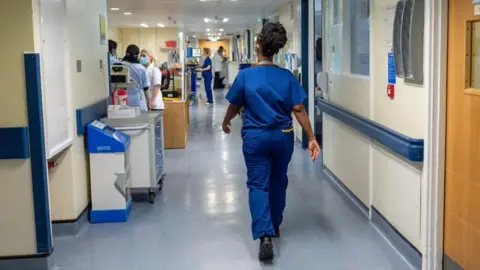In the lead-up to a significant doctors’ strike, the British Medical Association (BMA) has expressed serious concerns over the safety of patients within the National Health Service (NHS). According to the BMA, NHS England’s strategy to manage the fallout from the upcoming strike may inadvertently jeopardize patient care. As outlined by the BMA, the health body’s plan to minimize disruption may stretch already limited resources too thin, risking the well-being of patients who depend on timely medical services.
The BMA advocates that NHS England’s strategy should indeed focus on limiting the cancellation of routine treatments, specifically identifying non-urgent procedures, such as knee and hip surgeries, which should only be canceled in exceptional circumstances. However, Dr. Emma Runswick, the deputy leader of the BMA, articulated to the BBC that this policy may result in numerous last-minute cancellations, which could potentially escalate into dangerous situations for patients. The BMA’s firm stance is that the safety of patients must take precedence over administrative strategies to handle the strike.
The strike is set to commence at 07:00 BST on Friday, signaling a critical moment for healthcare services as resident doctors—formerly referred to as junior doctors—prepare to walk out. During previous strikes in 2023 and 2024, there had been widespread cancellations of non-urgent medical work as senior doctors stepped in to cover emergency services. Dr. Runswick emphasized the physical limitations of senior doctors, asserting that they cannot be in two places simultaneously, thus warranting a reconsideration of scheduling to ensure adequate patient care.
Throughout earlier strike actions, NHS England had advised healthcare facilities that rescheduling and postponing appointments would be indispensable for the preservation of safe care. Therefore, in some hospitals, as much as half of all planned care was abruptly canceled to cater to emergency demands. This ongoing dilemma is currently overseen by Sir Jim Mackey, who has taken the helm of NHS England following Amanda Pritchard’s departure. Mackey has committed to minimizing disruption, recognizing that patient safety is compromised whenever non-urgent care is halted.
Additionally, in the strain of these circumstances, Dr. Runswick defended the high sums charged by senior doctors who are filling in during the strike. The BMA has proposed a rate exceeding £300 an hour for coverage during night shifts, arguing that such incentives are vital to encourage medical professionals to take up additional responsibilities outside of their normal work schedules.
The BMA has engaged with NHS England in discussions regarding strike organization over the past week, articulating their concerns in a formal letter addressed to Sir Jim. Prof. Meghana Pandit, the co-medical director of NHS England, emphasized that maintaining a high standard of urgent and planned care is imperative during the strike period, advocating for a collaborative effort with the BMA to achieve this goal.
Efforts to avert the strike are ongoing, with conversations between the government and the BMA revealing varying perspectives and negotiations around compensation. While resident doctors recently received an average pay increase of 5.4% for the fiscal year, the BMA asserts that real wages remain approximately 20% lower compared to levels from 2008, prompting their demand for “pay restoration.” Health Secretary Wes Streeting announced that additional pay for this fiscal year would not be feasible, though there may be considerations regarding student debt, examination fees, and working environments.
Given the substantial number of resident doctors within the workforce—nearly 50% of doctors are resident doctors, and approximately two-thirds belong to the BMA—the outcome of impending negotiations will be pivotal. If the strike is to be canceled, it must occur before Wednesday morning to prevent significant disruption to hospital operations. The previous strikes led to the cancellation of hundreds of thousands of outpatient appointments and procedures, suggesting that any continuation of this trend could immensely affect patient care across the NHS.











